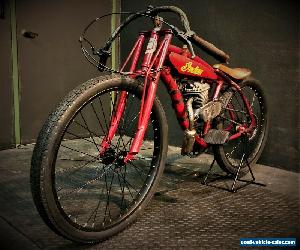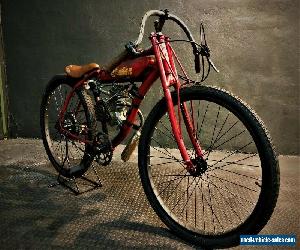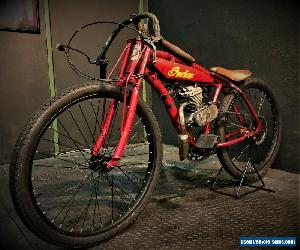1912 Indian BOARD TRACK RACER TRIBUTE
 »
Motorcycles for sale in Canada » Indian » BOARD TRACK RACER TRIBUTE » 1912 Indian BOARD TRACK RACER TRIBUTE for sale
»
Motorcycles for sale in Canada » Indian » BOARD TRACK RACER TRIBUTE » 1912 Indian BOARD TRACK RACER TRIBUTE for sale



| Condition: | New |
| Year: | 1912 |
| Exterior Color: | RED/GOLD |
| Manufacturer: | Indian |
| Engine Size (cc): | 80 |
| Model: | BOARD TRACK RACER TRIBUTE |
| Warranty: | NO |
| Sub Model (Optional): | 'BATTLE WORN'. |
| Vehicle Title: | Clear |
| Type: | RACER |
| Price: | US $2,600.00 |
| Got questions? | Ask here! |
The Early Deadly Days of Motorcycle Racing 1912 INDIAN BOARD TRACK RACER 'DEATH RACE' TRIBUTE. BIKE'S HAND CRAFTED FOR STEEL BUFFALO MOTORS AND BUILT TO RESEMBLE THE GLORY DAYS OF BOARD TRACK RACING. Special painted to look like it just came back from deadly race. Speed reaches to 35mph. Great show case for the office, living room or man cave.History:The Hendee Manufacturing Company introduced the 1.75-horsepower, single-cylinder Indian in 1901. Harley-Davidson followed in 1903. Inevitably, racing ensued. Early contests were held on horse-racing ovals and bicycle velodromes, but around 1909 wooden tracks built specifically for cars and motorcycles began to appear in Los Angeles and then elsewhere.It was in 1911 that livery worker named Ashley Franklin Van Order moved from Illinois to Southern California so he could ride his motorcycle year-round. Van Order took job selling Harley-Davidsons and began riding competitively, but his racing career was cut short soon afterward by an accident, followed by an ultimatum. “His wife, Lilly, told him that if he ever rode again, she was out of there,” says Van Order’s grandson, Jim Bolingmo Sr., retired professor of science and math. Van Order turned to photography, and the images he amassed from the mid-1910s through the 1920s-his own and possibly others’-constitute the most complete and compelling visual record of early motorcycle racing.The races must have been spectacular for people who were accustomed to thinking of horsepower in terms of actual horses. The bikes were designed to run fast, and that was about it: they had to be towed behind other motorcycles to get them started, and they had no brakes. The tracks, called motordromes, came in various sizes-a circuit of mile and quarter occupied the current site of the Beverly Wilshire Hotel in Beverly Hills-and were made of lengths of 2-by-2 and 2-by-4 lumber with rough-cut surfaces. The turns were severely banked, allowing riders to reach speeds of more than 100 miles an hour. Crashes were frequent and horrific-riders who went down faced being impaled by splinters-and often fatal. Spectators shared in the risk: at many motordromes, they peered down from the lip of the track, in harm’s way. On one particularly lethal day in 1912, several observers-from four to six, accounts vary-were killed along with Eddie Hasha and another rider at motordrome in Newark, New Jersey, when Hasha lost control of his bike and slammed into the crowd.David Schonauer is the former editor in chief of American Photo and has written about visual culture for several magazines.
Also published at eBay.ca
Comments and questions to the seller: